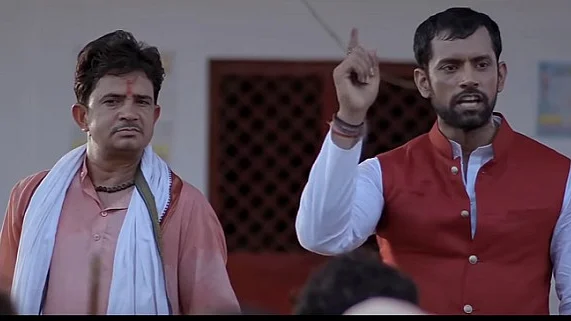Unmaad review: A film that captures stark realities of cow vigilantism
The film is different than any main stream commercial Hindi film, as there are no known faces as leads, the canvas and the character are not larger than life but excruciatingly real

Watching Unmaad was reminiscent of good old NFDC days when government funding encouraged parallel and more meaningful cinema in the 80s. But this film was different, in the sense that it was made by a group of likeminded people with no government funding at all. It was reminiscent of the spirit of IPTA as well, when people collected chanda and performed a play on some socio-political cause on a shoe string budget.
The film is different than any main stream commercial Hindi film, as there are no known faces as leads, the canvas is not larger than life but excruciatingly real, and protagonist is actually a contrast to handsome, powerful and capable image of a hero that Hindi cinema usually projects.
It starts slowly, like a documentary, but catches up, then slackens and again catches up by the end. The story is simple, relevant and grounded in reality, the characters too are very real, most of them played by the theatre actors. It almost starts sounding like a play at certain points, particularly when the Hindus and Muslims of the village start shouting their own religious slogans, the court scenes too have a remarkable tinge of theatre.
But nevertheless, the film holds you. Primarily because it is very different from mainstream and even niche cinema for the uninitiated, plus a certain element of unpredictability in the story keeps you glued.
Unmaad is a simple story of a Muslim butcher, Kallu in probably a village in western Uttar Pradesh. Faced with severe poverty, he goes to his Hindu friend Shambhu to ask for help. Shambhu gives his ox to him to sell in the market. On way to the market with the ox, Kallu comes across Hindu leader and Shambhu’s brother Shankar and his goons. Shankar aspires to be an MLA from that region, so he wants to stir up religious sentiments and starts beating Kallu accusing him of taking a cow to the slaughter house. The matter goes to the court. Kallu keeps repeating that it's not a cow but an ox which he was taking to the market, but nobody listens.
Imtiaz Ahmad as Kallu has given a marvelous performance. Amit Pundir as the villain Shankar is impressive. Pradeep Kataria as the corrupt police cop is also very interesting. Another interesting character is one in the Hindutva group who keeps quoting wrong mythological character and episodes.
Then there is a 'Hindu’ journalist who loves a Muslim girl and helps Kallu during his trial in the court.
There is no lecturing or resounding retaliation as in Mulk. The economy behind beef industry is presented as is and the predicament of a poor person trapped in communal politics is also reflected without any melodrama in the movie. The film tries to highlight the sad reality of love jihad too but not much attention is paid to this theme as the main story in itself is quite captivating.
Though throughout the film, a sense of the lack of funds pinches and the film unfolds more like a play, yet it definitely leaves an indelible mark.
Imtiaz Ahmad as Kallu has given a marvelous performance. Amit Pundir as the villain Shankar is impressive. Pradeep Kataria as the corrupt police official is also very interesting. Another fascinating character is one in the Hindutva group who keeps quoting wrong mythological character and episodes. There’s another who keeps telling in regular intervals that the animal being taken by Kallu is an ox and not a cow. Such small characters and episodes keep the film interesting which otherwise is a little slow and definitely centres around a serious theme.
Unmaad should be seen for many reasons—mainly because it’s a courageous effort to make a feature film on a very low budget without any assistance from big banners. Moreover it is based on a very relevant theme of lynching Muslims in the name of the cow without saying it loudly or using violence.
The film depicts beautifully the deep-seated interconnection between different communities in Indian society. Last but not the least the director Shahid Kabeer should be lauded for picturising the rugged landscape of Western UP and desolate, unwelcoming streets of a village there beautifully. He has used the local dialect effectively. Commercial Hindi cinema usually ignores the local landscape which in itself can be projected as a powerful character.
Shahid is expected to climb up the ladder of success fast. But I wish this trend of making low budget films continues in Hindi cinema, so that we get to see more such meaningful movies--which are not polluted by the compulsions of commercial cinema.
Follow us on: Facebook, Twitter, Google News, Instagram
Join our official telegram channel (@nationalherald) and stay updated with the latest headlines
Published: 09 Aug 2018, 2:38 PM
